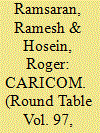|
|
|
Sort Order |
|
|
|
Items / Page
|
|
|
|
|
|
|
| Srl | Item |
| 1 |
ID:
082246


|
|
|
|
|
| Publication |
2008.
|
| Summary/Abstract |
The article examines economic performance in the CARICOM Region against the background of the challenges facing the growth of both regional and international trade. It argues that CARICOM has not only failed to create the expected dynamic in intra-regional trade but has also failed to lay the groundwork for a competitive and efficient manufacturing sector that could exploit foreign market opportunities in an increasingly transparent global economy. A strategy for greater competitiveness needs to embrace a broad range of non-price factors
|
|
|
|
|
|
|
|
|
|
|
|
|
|
|
|
| 2 |
ID:
082248


|
|
|
|
|
| Publication |
2008.
|
| Summary/Abstract |
Catastrophic events resulting from natural and anthropogenic causes have exacted an enormous toll on small island developing states (SIDS) for many centuries. Several studies have provided useful insights into the identification of vulnerabilities as a means of reducing exposure and preparing for incidents, as well as to help manage the impact of these unavoidable disastrous events. However, the vulnerability hypothesis has largely concentrated on the exposure of countries to hazards that are caused by economic, social, and environmental conditions. In this article, we extend the analysis to incorporate, the deployment of information and communication technologies (ICT) in SIDS, the vulnerabilities associated with these ICT, and the impact they could have and, indeed, are having on other types of vulnerabilities. Firstly, we use Briguglio's (1997) normalization procedure to construct vulnerability indices for the three main tenets of vulnerability faced by SIDS; secondly, we formulate an ICT-specific vulnerability index (VI) through the identification of underlying factors that make up the sub-components of this intermediate composite index. Thirdly, elucidating the methodology of Krajnc and Glavi (2005), we propose to merge the measurements of the two intermediate composite indices (the Societal VI and the ICT-specific VI) to produce a mega-composite ICT resilience index. Finally, in this conceptual article, we assess how the factors that contribute to ICT vulnerability could possibly be used to prescribe an ameliorative resilience regime that may assist in bolstering disaster preparedness in SIDS and, simultaneously, increase their ability to compete globally
|
|
|
|
|
|
|
|
|
|
|
|
|
|
|
|
| 3 |
ID:
082249


|
|
|
|
|
| Publication |
2008.
|
| Summary/Abstract |
The level of foreign direct investment (FDI) in the hotel sector of the tourism industry in Jamaica is unprecedented. This study seeks to understand the motivation for such investments using the extant theories of FDI as the conceptual framework. To achieve this aim, the study draws on the qualitative analysis of data gathered through face-to-face interviews with hotel managers, government policy makers and ambassadors from the investing countries to shed light on the issue. The conclusions reveal that intense competition in the home market has forced the multinational enterprise to seek markets abroad. Jamaica was chosen as a location because of its proximity to the US market and also the level of infrastructure development in the economy. However, because of the service-oriented nature of these multinational enterprises, the investors opted for FDI instead of other entry modes. These FDIs have changed the structure of the tourism industry in Jamaica and have led to increased levels of competition in the industry which, this study argues; is healthy for improved competitiveness in the industry
|
|
|
|
|
|
|
|
|
|
|
|
|
|
|
|
| 4 |
ID:
082247


|
|
|
|
|
| Publication |
2008.
|
| Summary/Abstract |
Globalization has been scape-goated for eroding both the structure and viability of various institutions in countries across the world. The Jamaican economy and society is no different. Globalization is a perennial challenge, forcing all institutions to create innovative ways to overcome existing vulnerabilities. There is reliance on the market and a need to identify the institutional arrangements that would make the 'promotion' or transition to upper-middle-income status easier and sustainable. The many challenges provide opportunities for public and private institutions, in particular, to become competitive in a global environment. This study uses developments from Jamaica's past to demonstrate the impact of state policies, which reflect varying degrees of institutional capacity, on the country's development. It suggests a new institutional path if Jamaica is to be propelled towards an era of competitiveness, sustainable growth and balanced development.
|
|
|
|
|
|
|
|
|
|
|
|
|
|
|
|
|
|
|
|
|